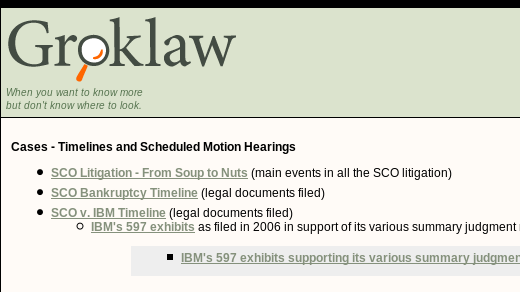Like many, I was surprised-but-not-really when Pamela Jones announced that she would be retiring original content on the legal analysis site that grew to fame within and without the open source community as it rose to do battle with the incredibly audacious claims by The SCO Group that Linux was directly derived from UNIX.
For eight years, Groklaw was the center of the fight between Linux companies and interests and SCO's efforts to build a licensing business on the back of open source. While Novell was legally the victor in the year-long legal fight by raising its hand and reminding everyone--including SCO, it seemed--that it was they, not SCO, who actually owned the UNIX copyrights.
Yeah, that was awkward. (But pretty funny.)
The not-really-surprised part comes from the fact that Jones herself hinted on Christmas Day that she was contemplating a change for her status on Groklaw. At the time, Jones seemed disillusioned that after all of the hard work performed on Groklaw by her and the über-dedicated group of volunteers, "Novell taking money from Microsoft and contractually agreeing to show up at Open XML standards meetings and events."
At the time, I pondered that Jones should seriously reevaluate the roles she and her team of Groklaw volunteers have within the free and open source community. I did not want such a reevaluation to end with the closure of the Groklaw web site, but it seems Jones has her own ideas.
Over the years, the role of Groklaw slowly shifted from an outright anti-SCO blog to (as its readership grew) a centralized documentation repository for other ongoing lawsuits in and around the FLOSS community, complete with editorial commentary. The overarching goal of the site seems to have been relatively static: defend the FLOSS community against misinformation based on legal attacks.
To me, that's an important distinction. Groklaw did not directly stop the SCO lawsuits; that was done by the lawyers, judges, and juries in the respective cases. The important thing Groklaw did was put the breaks on business practices that could have been more immediately injurious to Linux, such as SCOsource, the IP protection scheme SCO started to generate more revenue from its alleged UNIX licenses and the alleged infringement of those licenses by Linux users.
Groklaw's deconstruction of the lawsuit and all of the related IP issues was enough to make potential SCOsource customers pause and have a "hey, what does God need with a starship?" moment. In that crucial moment, they would realize that perhaps waiting to see how the lawsuits turned out would be a better idea... and not buy a SCOsource license to use Linux. That was enough to stop any momentum of SCOsource revenue, and ultimately would make it a lot harder for SCO to fund its case.
In a world without Groklaw, would Novell, IBM, and Red Hat defeated SCO? Based on pure facts, yes. It's likely that SCO would have been defeated anyway. But a better-funded alternate-universe SCO would have made that legal battle even more arduous and convoluted than the one in our own universe. And certainly the commercial success Linux has enjoyed in the last decade would have been far more muted.
For Jones, Groklaw's mission (stopping SCO from hurting Linux) basically succeeded. So now she is closing up shop. I would have preferred that Groklaw become a more community-run site, but this is not my decision to make. Nor the readers of Groklaw. The site, really, is purely Jones' and she should do what she needs to move on.
I find myself bemused about my own reaction to Groklaw's departure. I cannot speak for others in my trade, but I will state for the record now that when Jones and Groklaw first grew to prominence, I was resentful. Who was this paralegal coming out of nowhere, reporting all this SCO news like it was just her business? How did a blog become part of the story?
I think that beyond the battle with SCO, Jones reminded me of a very valuable lesson, one that I had forgotten all wrapped up in my formal journalist guise, with all of the ego and pretensions that can come with any profession. The lesson was this: truth is truth, and it deserves to be shared. Journalists like me used to cringe at bloggers like Jones, resenting their intrusion on what was deemed our job and our job alone. But over the years I came to respect the fact that no one has an exclusive on what needs to be said. I was being a hypocrite.
Good writing is good writing. Good research is good research. And like my very first boss told me when he hired me 21 years ago to run a small-town Indiana newspaper: good reporters don't have to come with a journalism degree.
That was the lesson I (who has no journalism degree) had forgotten. Groklaw didn't set out to remind me and others like me of the power of the written word. Of the strength of collaboration. But along the way, that's exactly what the site and its creator did.
More than anything, Groklaw represents what open source collaboration can achieve.
[first posted at ITWorld]







7 Comments